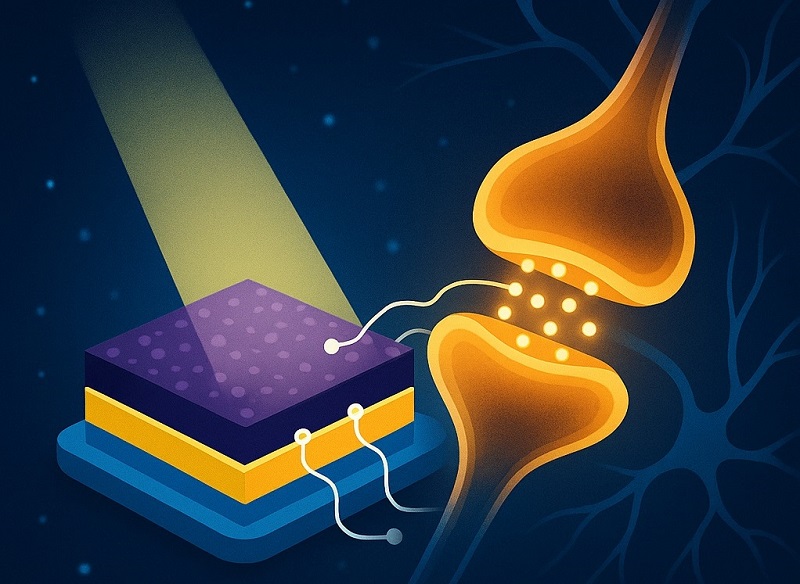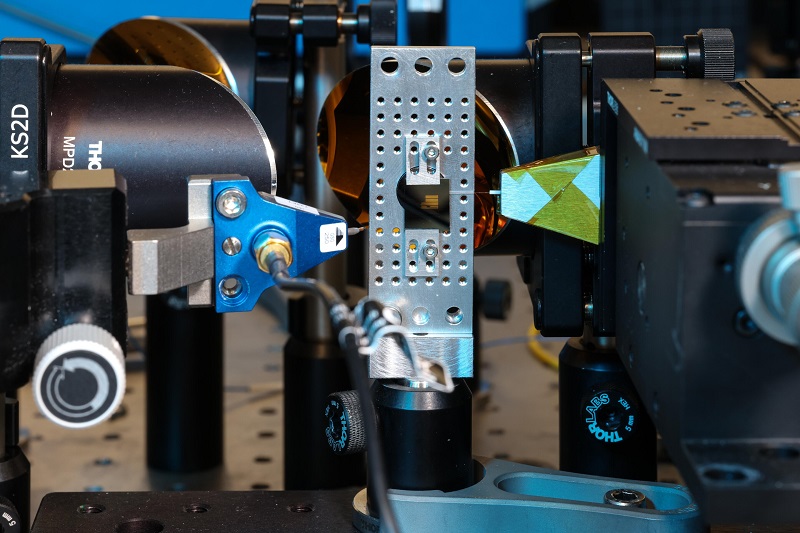An interdisciplinary research team has engineered a new class of organic photoelectrochemical transistors (OPECTs). These tiny devices can convert...
Vous n'êtes pas connecté
Rubriques :
 - TECHXPLORE.COM - RSS news feed - 31/Jul 16:50
- TECHXPLORE.COM - RSS news feed - 31/Jul 16:50
Light-sensitive materials mimic synapses in the brain
An interdisciplinary research team has engineered a new class of organic photoelectrochemical transistors (OPECTs). These tiny devices can convert light into electrical signals and mimic the behavior of synapses in the brain. The research results have now been published in the research journal Advanced Science.
Articles similaires
Scientists develop light-responsive transistors that mimic brain synapses
An interdisciplinary research team led by Professor Francesca Santoro and Dr. Valeria Criscuolo from the Institute of Biological Information...
Scientists develop light-responsive transistors that mimic brain synapses
An interdisciplinary research team led by Professor Francesca Santoro and Dr. Valeria Criscuolo from the Institute of Biological Information...
Light-sensitive material could help electronics think like the brain
Scientists have developed a new material that can turn light into electrical signals and behave much like the brain’s own nerve cells. This...
Light-sensitive material could help electronics think like the brain
Scientists have developed a new material that can turn light into electrical signals and behave much like the brain’s own nerve cells. This...
Why Alzheimer’s affects some brain areas more than others
Researchers from the University of California, San Francisco (UCSF) have uncovered new insights into how Alzheimer’s disease spreads in the brain...
Why Alzheimer’s affects some brain areas more than others
Researchers from the University of California, San Francisco (UCSF) have uncovered new insights into how Alzheimer’s disease spreads in the brain...
Flexible optoelectronic device with minimal defects fabricated at just 90°C
Dr. Jung-Dae Kwon's research team at the Energy & Environmental Materials Research Division of the Korea Institute of Materials Science (KIMS) has...
Flexible optoelectronic device with minimal defects fabricated at just 90°C
Dr. Jung-Dae Kwon's research team at the Energy & Environmental Materials Research Division of the Korea Institute of Materials Science (KIMS) has...
Scientists build tiny chip to supercharge future wireless networks
A team of researchers from EPFL in Switzerland and Harvard University has developed a powerful new chip that could revolutionize the way we transmit...
Les derniers communiqués
-
Century Communities Announces Return to Popular McCormick Development in Port Orchard, WA
Century Communities - 14/08/2025
-
South University, West Palm Beach Physician Assistant Program Achieves 10-Year Accreditation-Continued Status from ARC-PA
South University - 14/08/2025
-
InventHelp Inventors Develop New Device to Store and Access Wet Wipes (PTA-378)
Inventhelp - 14/08/2025
-
Synergy Spine Solutions Appoints Troy Wahlenmaier as Chief Commercial Officer
Synergy Spine Solutions - 14/08/2025
-
Fanatics Branded NFL, NBA, MLB & NHL Apparel Sales Banned in Australia
FanFirm Pty Ltd - 12/08/2025
-
WestBow Press Announces the book, Answer With Truth, Has Earned Exclusive Lighthouse Recognition
WestBow Press - 12/08/2025
-
ClariMed Inc. Acquires We Are Human, Expanding Growth into Southeast Market
ClariMed Inc. - 12/08/2025
-
SIS, LLC Announces Successful Go-Live of CRB on Microsoft Dynamics 365 and SIS Construct 365 Project Cost Management
SIS, LLC - 12/08/2025
-
Michael Bevis, PhD Joins TrueSpace as EVP to Expand the Scale-Ready Standard for Entrepreneurs
TrueSpace - 12/08/2025
-
Zilliz Powers the Next Wave of AI Adoption with Unmatched Enterprise Security and Compliance
Zilliz - 12/08/2025



